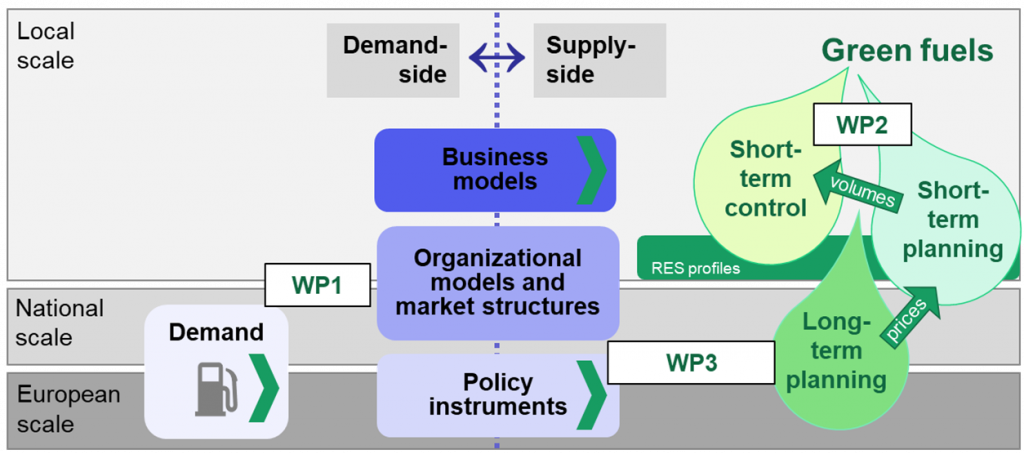Markets, Policies, and Business Models for Green Fuels
- Coordinator: Technical University of Denmark, Dogan Keles
- Principal investigator at CSEI: Alexandra Lüth
- Funding body: Danmarks Innovationsfond – Innomission 2: Green Fuels in Transport and Industry (MissionGreenFuels)
- Period: January 2024 – December 2025
- Project website: https://missiongreenfuels.dk/
Summary
The overall objective of this project is to assess the market potential for hydrogen and green fuels and their implications for the European electricity market. As such, it will focus on both, the short-term operations of PtX assets on different electricity markets (spot and balancing power), as well as the long-term market design, and regulation of green hydrogen/fuels and biofuels to support the deployment of PtX serving the industrial and transportation demands throughout Europe.
The project consists of three work packages that cover the analysis of markets for hydrogen and green fuels, as well as the interaction of PtX with electricity and energy markets along three dimensions: time (real-time/control, short-term, and long-term), space (local, national, and European), and products (electricity, hydrogen, and green fuels).
The project develops a framework for technology operators and policymakers in Denmark to enable the plans of the Danish PtX strategy and the green fuel mission. It aims at creating input for economically viable supply and use of green fuels and will investigate the roles and operation of assets in respective markets. Finally, the project provides business model insights to ensure profitable use in Denmark and beyond.
The market potential assessment for hydrogen and green fuels and their implications for electricity markets can be extended across Europe and beyond. The developed long-term planning models and short-term PtX operational strategies can be applied globally in market-based power and energy systems. Uptake by the industry partners and/or subsequent research projects can manage the local needs, allowing the project results to be applied globally. In addition to the industry partners in the project, the wider Danish industry, such as Ørsted, CIP, and Vestas, with whom the academic institutions work, can help in internationalising the project results. The results will be presented in international organisations and networks in which the project partners lead or participate, such as EERA JP Wind, EERA JP Energy Systems Integration, and IEA Wind Task 25 on energy systems.
Partners
- Danmarks Tekniske Universitet (DTU), DTU Management
- Danmarks Tekniske Universitet (DTU), DTU Wind
- Danmarks Tekniske Universitet (DTU), DTU Compute
- Copenhagen Business School (CBS)
- Biogas Denmark
- ENFOR
- Energi Danmark
- EVIDA
- Hybrid Greentech

